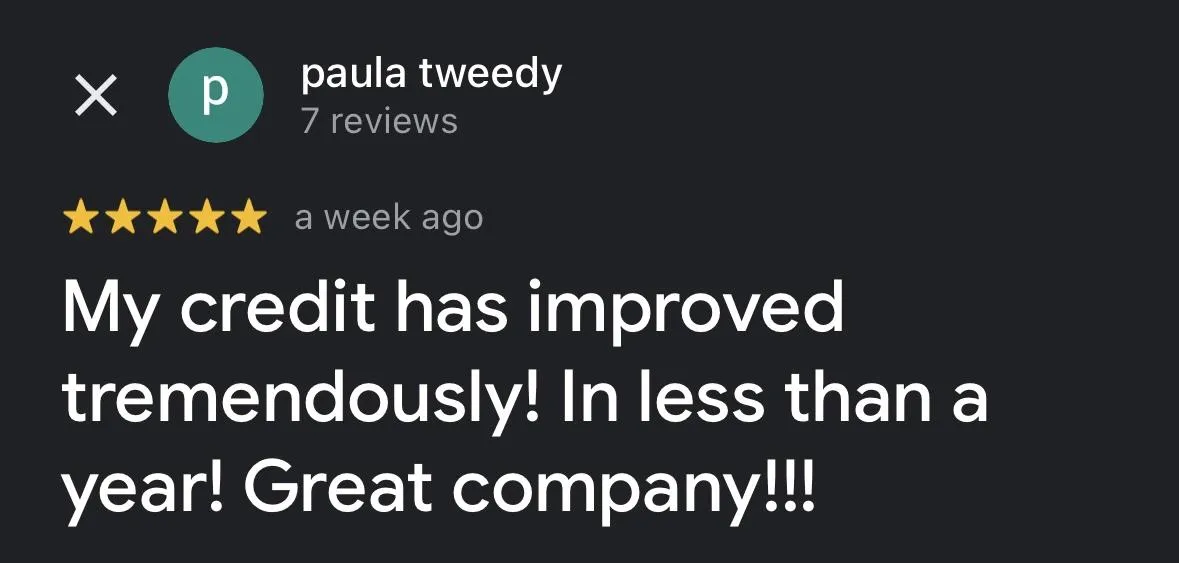Action Required Before Funding:
Hey ,
It looks like you’re not quite eligible for our funding program at this moment. But don’t worry—this isn’t the end of the road. We understand that everyone’s journey is unique, and we’re here to help you get back on track.





Don't Let Bad Credit Hold You Back
Before you can take full advantage of our funding options, it’s important to have a solid credit profile. That’s where our expert credit repair service comes in. We’ll work with you in-house to improve your credit score and help you qualify for funding.
200+ Average Score Increase
Fast Results - as fast as 72 hours, average of 30 Days
Removes Bankruptcies, Foreclosures, Repossessions, and More

What Our Clients Have To Say
Lorum Ipsum
Lorum Ipsum
Lorum Ipsum
Lorum Ipsum
What Can Be Removed?
FORECLOSURES
STUDENT LOANS
LATE PAYMENTS
BANKRUPTCIES
COLLECTIONS
REPOSSESSIONS
MEDICAL BILLS
HARD INQUIRIES

It's all about the results.
200+
Average Score Increase
9+
Average Items Removed
4.7
Trustpilot Rating
100 +
Positive Reviews
Don't Take Our Word For It
See why customers love FFB Enterprises








Blog
Lets stuff keywords into blogs for longform evergreen SEO. Will want to find a lot of back links.

Top Funding Options for Your Startup Business
Starting a business can be both exciting and challenging. Securing the necessary funding is one of the most critical aspects of getting your startup off the ground. Fortunately, there are several funding options available to entrepreneurs. Here’s a comprehensive guide to the top funding options for your startup business:
1. Bootstrapping
Self-Funding
Bootstrapping involves using your savings or personal funds to finance your startup. This method allows you to control your business completely without taking on debt or giving up equity.
Benefits
· Full ownership and control
· Avoiding debt and interest payments
· Quick decision-making
Drawbacks
· Limited resources
· Personal financial risk
2. Friends and Family
Informal Loans or Investments
Friends and family can be a valuable source of funding. They may offer loans or investments based on their trust in you and your vision.
Benefits
· Flexible terms
· Potentially lower interest rates
· Emotional support
Drawbacks
· Risk of strained relationships
· Informal agreements can lead to misunderstandings
3. Angel Investors
Individual Investors
Angel investors are affluent individuals who provide capital to startups in exchange for equity or convertible debt. They often have experience in the industry and can offer valuable mentorship and connections.
Benefits
· Access to Capital
· Mentorship and networking opportunities
· Flexible investment terms
Drawbacks
· Dilution of ownership
· Potential for differing visions
4. Venture Capital (VC)
Professional Investment Firms
Venture capital firms invest in high-growth startups in exchange for equity. They typically provide substantial funding and strategic guidance to help scale the business.
Benefits
· Large amounts of capital
· Strategic support and expertise
· Networking opportunities
Drawbacks
· Significant equity dilution
· Pressure to achieve rapid growth
· Potential loss of control
5. Crowdfunding
Online Platforms
Crowdfunding involves raising small amounts of money from many people through online platforms like Kickstarter, Indiegogo, and GoFundMe.
Benefits
· Access to a broad audience
· Marketing and validation of your idea
· Flexible funding goals
Drawbacks
· Time-consuming campaign management
· There is no guarantee of success
· Potential for unmet expectations from backers
6. Small Business Loans
Bank Loans
Traditional bank loans are a common funding source for startups. They require a solid business plan, good credit, and collateral.
Benefits
· Retention of full ownership
· Fixed interest rates and repayment terms
· Potentially large loan amounts
Drawbacks
· Strict eligibility criteria
· Personal liability
· Lengthy approval process
SBA Loans
The U.S. Small Business Administration (SBA) offers various loan programs to help startups and small businesses. The government partially guarantees these loans, making them less risky for lenders.
Benefits
· Lower interest rates
· Longer repayment terms
· Easier access compared to traditional bank loans
Drawbacks
· Extensive paperwork and approval process
· Collateral and personal guarantees required
7. Grants and Competitions
Government and Private Grants
Various government agencies and private organizations offer grants to startups, particularly those in specific industries like technology, healthcare, and education.
Benefits
· Non-repayable funds
· No equity dilution
· Recognition and credibility
Drawbacks
· Highly competitive
· Lengthy application process
· Restrictions on how funds can be used
Startup Competitions
Participating in startup competitions can provide funding, mentorship, and exposure. Prizes often include cash, services, or investment opportunities.
Benefits
Access to capital and resources
Networking and mentorship
Increased visibility
Drawbacks
Intense competition
Time-consuming preparation
8. Incubators and Accelerators
Structured Programs
Incubators and accelerators offer funding, mentorship, and resources to startups. Incubators focus on early-stage startups, while accelerators aim to scale existing businesses.
Benefits
· Access to capital and resources
· Mentorship and support
· Networking opportunities
Drawbacks
· Competitive application process
· Potential equity dilution
· Time commitment to program requirements
9. Strategic Partnerships and Joint Ventures
Collaborative Funding
Strategic partnerships or joint ventures with other companies can provide funding, resources, and expertise. These partnerships often involve sharing equity or profits.
Benefits
· Access to additional resources
· Shared risks and costs
· Combined expertise
Drawbacks
· Shared control and decision-making
· Potential conflicts of interest
· Complexity in managing partnerships
10. Revenue-Based Financing
Growth-Linked Repayment
Revenue-based financing involves receiving capital in exchange for a percentage of your future revenues. This method is suitable for startups with consistent revenue streams.
Benefits
· No equity dilution
· Flexible repayment linked to revenue
· No personal collateral is required
Drawbacks
· Potentially higher cost compared to traditional loans
· Pressure to maintain revenue growth
· Complex repayment calculations
Conclusion
Securing the right funding is crucial for the success of your startup. Each funding option has its own advantages and disadvantages, so choosing the one that best aligns with your business goals and financial situation is essential. Whether you opt for bootstrapping, seeking venture capital, or exploring alternative financing methods, a well-thought-out funding strategy can help propel your startup to new heights.
© 2025 FFB Enterprises LLC. All rights reserved.

